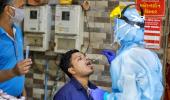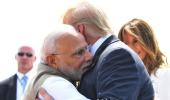A British Sikh cardiologist is back on the coronavirus frontline at a west London hospital after being struck down by the deadly virus himself last month.

Dr Harmandeep Singh, 36, spoke of how he and his wife shut themselves out of all social contact last month as soon as he started experiencing extreme tiredness and fever -- some of the symptoms of COVID-19.
They focussed on monitoring each other's breathing through their speech to assess the seriousness of their condition.
"If you can't talk in full sentences that's when your lungs are being affected, that's the time you need to seek medical help," Singh told My London.
The doctor is now back working at Ealing Hospital after a nearly 12-day spell of Covid-19, which ranged from a high heart rate to no energy and breathing difficulties to sudden improvement.
"That does reflect with patients that we are seeing, sudden deterioration or sudden improvement in 24 hours," he said.
"I know most people will get a mild disease and get over it. But for those who are getting severe disease it can be life changing for the families and it is extremely hard for us to see that suffering in those patients as well," said the doctor with 12 years' experience behind him.
London North West University Healthcare NHS Trust, which manages Ealing Hospital where Singh works, has registered one of the highest number of coronavirus deaths in England.
However, the focus of the hospital has been on highlighting some of the positive progress each morning and look at the number of patients they have been able to discharge.
Singh said: "We've had people in their 90s who we thought were at the end of their lives and will not make it, we made the phone calls, explained to the families, and three days later they were at home.
"So it's not all bad, we've had good success in sending people home."
The hospital has also extended its focus on non-coronavirus related cases to ensure those with other health problems receive the critical care required.
Meanwhile, Singh reiterated the United Kingdom government message for people to stay at home and follow the social distancing rules to help frontline National Health Service (NHS) workers do their job.
"This essentially is a war, it's what we are in, so people need to understand and take it seriously. The NHS is up for the fight, but what the NHS really needs from the general public is they need to stay indoors," he said.











 © 2025
© 2025